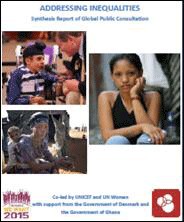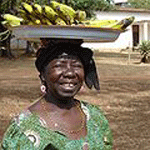Published on Thu, 2013-02-14 21:22
The Finnish government wants to be an accountable member of the international community, but its political will to be so does not always transpire. Finland has not, for example, been able to reach the 0.7 % target for its development funding. |
Published on Thu, 2013-02-14 19:54
Costa Rica has an outward image of sustainable country, committed to the environment; but the inner reality is very different. The tension between conservation and productive activities cause increasing social unrest because of land use. As an example of (un) fulfillment of the Millennium Development Goals we address the case of agroindustrial production of pineapple, which has been besieging communities and protected areas, and displacing traditional crops of nourishing importance. The technological package of agrochemicals used systematically is causing great concern, as it causes contamination of water sources. |
Published on Tue, 2013-02-12 16:51
The Synthesis Report of Global Public Consultation is based on and reflects an extensive global public consultation, held from September 2012 to January 2013. The Consultation process was co-led and facilitated by UNICEF and UN Women. |
Published on Thu, 2013-02-07 19:56
In some areas of its foreign policy, Switzerland does not earn the best marks for its contribution to the Millennium Development Goals. Its finance and trade policy is driven by self-interest and contributes to restricting the policy space of poor countries. Although Switzerland has substantially increased its development budget and pursues good pro-poor development cooperation by international comparison. As a donor country Switzerland is bound primarily by the eighth Millennium Development Goal (MDG). This means that it should support the poorest countries in realising development goals 1 to 7 and adapt its trade policy and that of its financial centre to the needs of the poorest countries. Its endeavours towards a coherent, pro-development policy have also remained rather modest. |
Published on Thu, 2013-02-07 19:28
The national MDG targets in Cameroon are far from becoming a reality by 2015. It is recommended to concentrate efforts on transparency in the management of public resources, on improving the quality of the education system, strengthening the Expanded Programme of Immunization and reducing childhood diseases, and the implementation of sustainable development programs, in particular through legislation on land and environmental management standards in the growth strategy. |
SUSCRIBE TO OUR NEWSLETTER







